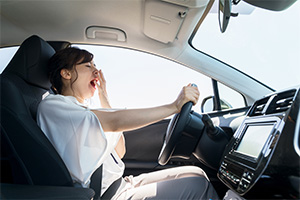
There is no denying that drowsy driving is dangerous. When you haven’t slept and must drive to work, school, or on a long road trip, the combination of being behind the wheel without enough sleep can be deadly. If you’re unable to stay awake while operating your vehicle it may be that you’re suffering from sleep apnea. Read on to discover the symptoms you should watch for and how your dentist can help you can the rest you need.
Driving While Drowsy: Just How Dangerous Is It?
Yes, falling asleep behind the wheel can result in serious harm for you or another person, but just how common is it and what dangers does it really pose? According to a 2017 study by the National Highway Traffic Safety Administration (NHTSA), 91,000 crashes resulted in 50,000 injuries and 800 deaths. Other researchers state that a drowsy driver was involved in 21% of car crashes.
The fact is that you don’t have to fall asleep for drowsy driving to be dangerous. When you are chronically fatigued, you can begin to doze in a matter of seconds. Taking your eyes off the road for even a split second can result in a fatal collision. It is believed that the same mental impairment that occurs in drunk individuals also occurs in those who are sleep deprived. As a result, the awareness of one’s surroundings and abilities makes them more susceptible to drowsiness and falling asleep.
The Symptoms of Sleep Apnea
While drowsy driving is just one of the many symptoms commonly associated with sleep apnea, it’s important that you survey other signs that are linked to this particular disorder. Some of these include:
- Moodiness
- Inability to focus or concentrate
- Frequent morning headaches
- Chronic, loud snoring
- Waking up out of breath or gasping for air
- Loss of libido
- Dry mouth
- Sore throat
- Chronic fatigue that lasts throughout the day
If you notice any of these symptoms, do not wait to see your doctor.
How Your Dentist/Doctor Can Help
Treating sleep apnea first begins with a scheduled consultation. After reviewing your symptoms and going over your medical history, your dentist will likely recommend you for a sleep study. While some do offer at-home tests you can do in the comfort of your own home, others require that you visit a sleep lab and undergo monitoring by lab technicians.
This analysis of your sleep patterns will then be reviewed to determine a formal diagnosis. If it comes back that you do have sleep apnea, your dentist can start the process of treatment. While CPAP (continuous positive airway pressure) therapy is most commonly recommended, there is an alternative solution that is more user-friendly and less cumbersome – oral appliance therapy.
Wearing a customized oral device while you sleep will help to shift your jaw forward just enough to keep any tissues from collapsing and creating a blockage along your airway. You will then be able to breathe freely throughout the night.
Don’t continue to risk your life by getting behind the wheel and driving while drowsy. Get the help you need by seeing your dentist and asking about oral appliance therapy today.
About the Author
Dr. Dean Hutto is a sleep apnea dentist in Baytown, Texas. He graduated from the University of Texas Dental School in Houston in 1992 and has continued to pursue advanced education in dentistry. As a dedicated professional who treats patients with sleep apnea, Dr. Hutto and his team at Sleep Better Baytown offer FDA-approved oral appliances to help individuals achieve the rest they need. To find out more about this beneficial alternative, contact us via our website or call (281) 688-2104.
